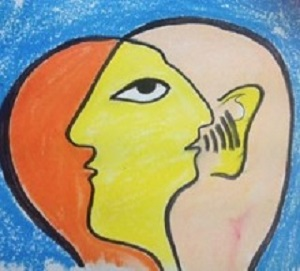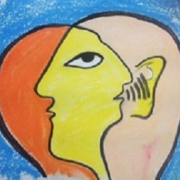List of Readings: Hearing Voices
CMB Network Members Tanya Luhrmann and Michael Lifshitz lead our focused discussion on Friday, January 15, 2021.
 Abstract: Hearing a voice, feeling the presence of another being, or feeling that another being is present in one’s own body are human experience that are both surprising common, and central to religious practice in many societies. They have been explained, or at least discussed scientifically, in a range of ways—dissociation, hypnosis, absorption, psychosis, reality monitoring and so forth— and there is still no settled consensus about how to make sense of these events or whether they are, in the end, the same kinds of events. All share what a non-faith perspective might call “non-agency”: a person experiences a thought or sensation, but attributes the thought or sensation to a source not themselves. We’ll talk about our work on this topic as a means of generating discussion.
Abstract: Hearing a voice, feeling the presence of another being, or feeling that another being is present in one’s own body are human experience that are both surprising common, and central to religious practice in many societies. They have been explained, or at least discussed scientifically, in a range of ways—dissociation, hypnosis, absorption, psychosis, reality monitoring and so forth— and there is still no settled consensus about how to make sense of these events or whether they are, in the end, the same kinds of events. All share what a non-faith perspective might call “non-agency”: a person experiences a thought or sensation, but attributes the thought or sensation to a source not themselves. We’ll talk about our work on this topic as a means of generating discussion.
Readings
The science of contemplation has focused on mindfulness in a manner quite disproportionate to its use in contemplative traditions.Mindfulness, as understood within the scientific community, is a practice that invites practitioners to disattend to words and images. The practitioner is meant to experience things as they “really are,” unfolding here and now in the flux of embodied sensations. Yet the use of words and images, together with intentions, is a farmore common contemplative practice. The authors present ethnographic research with a syncretic contemplative tradition, Integral Transformative practice (ITP), which grew out of the Human Potential Movement of the 1960s. The authors focus on the practice of “affirmations,” in which practitioners seek to actualize spiritual goals by imagining future possibilities. Our ethnographic account invites new avenues for psychological research to illuminate the role of words and images in contemplation.
Culture and the Plasticity of Perception (Lifshitz & Luhrmann, 2019)
Culture shapes our basic sensory experience of the world. This is particularly striking in the study of religion and psychosis, where we and others have shown that cultural context determines both the structure and content of hallucination-like events. The cultural shaping of hallucinations may provide a rich case-study for linking cultural learning with emerging prediction-based models of perception.
That trauma can play a significant role in the onset and maintenance of voice-hearing is one of the most striking and important developments in the recent study of psychosis. Yet the finding that trauma increases the risk for hallucination and for psychosis is quite different from the claim that trauma is necessary for either to occur. Trauma is often but not always associated with voice-hearing in populations with psychosis; voice-hearing is sometimes associated with willful training and cultivation in nonclinical populations. This article uses ethnographic data among other data to explore the possibility of multiple pathways to voice-hearing for clinical and nonclinical individuals whose voices are not due to known etiological factors such as drugs, sensory deprivation, epilepsy, and so forth. We suggest that trauma sometimes plays a major role in hallucinations, sometimes a minor role, and sometimes no role at all. Our work also finds seemingly distinct phenomenological patterns for voice-hearing, which may reflect the different salience of trauma for those who hear voices.
Some people seem to have a ‘talent’ for spiritual experience: they readily sense the presence of supernatural beings, receive special messages from God, and report intense feelings of selftranscendence, awe and wonder. Here we review converging strands of evidence to argue that the trait of ‘absorption’ captures a general proclivity for having spiritual experiences. Participants scoring highly on the Tellegen Absorption Scale report vivid experiences of hearing God’s voice during prayer, intense mystical experiences in response to psychedelics or placebo brain-stimulation, and strong feelings of presence and transcendence when confronted with natural beauty, virtual reality, or music. Several mechanisms may help to explain the relationship between absorption and spiritual experience. We suggest that absorption captures an experiential mindset that intensifies inner and outer sensory experience in ways that reflect both prior expectation and novel sensory engagement. It seems to enable that which must be imagined to feel more real.


